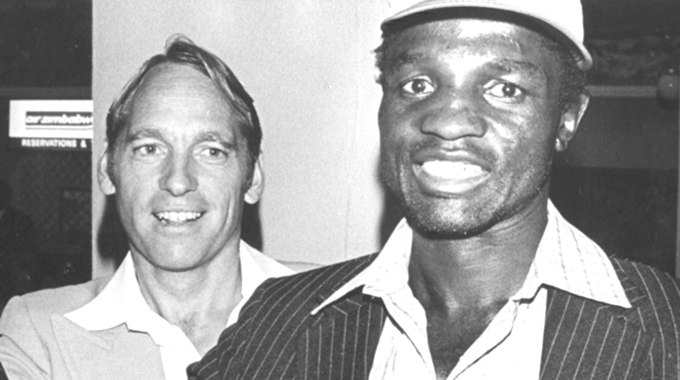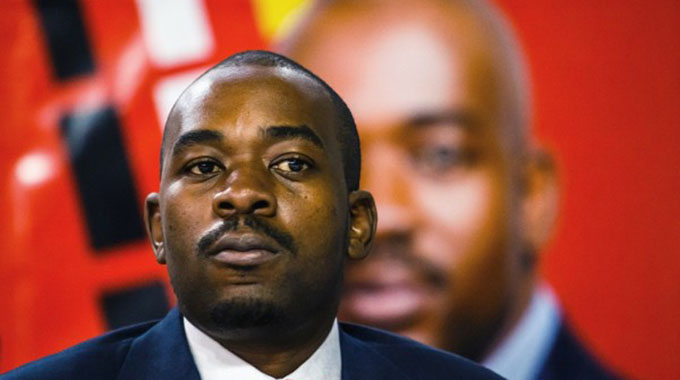Schoolboy would have been a world boxing champion

Robson Sharuko Senior Sports Editor
DAVE WELLINGS, the British boxing trainer and manager who was in Langton Tinago’s corner during the boxer’s best years in the ring, has said ‘’Schoolboy’’ was good enough to have been a world champion.
Wellings now leaves in Queensland, Australia, but spent a lot of time here where he transformed himself into a master who managed and promoted some of Zimbabwe’s finest boxers during a golden period for the sport in this country.
He turned into Tinago’s mentor and confidante in a partnership that saw the transformation of the boxer into a three-time Commonwealth champion and a place in the Guinness Book of Records.
Tinago, the finest pound-for-pound king to emerge from this country, died a year short of his 70th birthday after a battle with pneumonia, and was declared a provincial hero and buried in Gweru.
There are many who believe his best years came when this country was a pariah state, with its best sporting talent barred from competing in world events, and Tinago was already 31 by the time Zimbabwe was readmitted into the international fold.
He still went on to win three Club titles.Wellings exclusively told The Herald from his base in Australia Tinago would probably have become a world champion had he been given a chance to fight for the WBC lightweight title against Scottish holder Jim Watt.
It’s a mark of Tinago’s excellence, something which is lost among today’s generation of boxing fans, writers and critics, that his name was featuring among some of the iconic names of the sport in the world — the likes of Watt and Panamanian legend, Roberto Duran, a four-weight world champion.
Known as ‘’Hands of Stone’’ for his formidable punching power, Duran was voted, in 2002, by The Ring magazine as the fifth greatest fighter of the past 80 years and one of the 25th best pound-for-pound boxers of all-time while the Associated Press named him the best lightweight boxer of the 20th Century.
Scottish boxer Watt took over the WBC world lightweight title after Duran had vacated it and Wellings believes Tinago would have beaten him for the world championship.
‘’To rate Schoolboy, you only have to consider that he met (and sometimes beat) half-a-dozen boxers who fought for world titles. That, by definition, makes him world-class,’’ said Wellings.
‘’Langton was already 29 when he joined my stable and considered by many to be past his prime. By the time he won the first Commonwealth title, the WBC world champion was a southpaw, Jim Watt of Scotland, and I was convinced then, and now, that he would have been tailor-made for Tinago.
‘’Langton hardly ever lost to a southpaw.
‘’I tried to arrange a challenge; I brought the Scottish national champion Willy Booth and even former WBC champion Ken Buchanan to Harare and Langton beat them both so the Scots knew we meant business — but we never got a shot at the world title.’’
Does Wellings consider Tinago the finest boxer he ever managed?
‘’Was Langton the finest boxer I ever handled? He was certainly the most successful,” he said. ‘’Stix Macloud was brilliant at his best, really exciting to watch.
“Flash Chisango had all the natural attributes of a world champion, except dedication. Langton had the dedication and the self-belief. I never had to urge him to train, I sometimes had to beg him to stop.
“Early in the morning he would run from my gym at Hatfield to the edge of Lake McIlwaine, return, then hit the heavy punch bag for an hour.
“In the evening he would be back for sparring and more training. As a person he was always polite and respectful with a good sense of humour so travelling around the world together was a pleasure.
“His finest achievement of record would have to be his first Commonwealth title, won in sauna-like conditions in Lagos, but for me his best fight was against Ken Buchanan in Harare.
“Buchanan was a Hall of Fame lightweight and had won all his bouts after making his return to the ring. Some critics claimed that he was past his best, but when he came to Harare he was a year younger than Tinago.’’
Wellings said he had known for some time that the legendary boxer was ill.
‘’I knew Langton had been ill for some time, but it was still a blow to hear of his passing,” he said while also revealing some intimate stuff.
‘’(There were) some hilarious moments, I’m not sure if you can print this.
“When Tinago was invited to East London to meet Nkosa ‘Happyboy’ Mxagi, it was intended as a warm-up fight as Happyboy was about to fight for a world title. He was the local hero and several of the pretty girls working at the hotel where we were staying came over to Langton to commiserate.
“’Happyboy knocks out all his opponents,’ they said. Langton replied ‘I’ll make a bet with you: if he doesn’t beat me, you must come to my room after the fight.’ Then he took their hand and wrote his room number on their hand along with the prescribed time.
‘’Five of them accepted the bet. The fight went the distance, two judges made it a draw and one gave it to Langton — so a majority draw. In my biased opinion it was a ‘home town draw’, but more importantly (to Langton) all five girls honoured their bet.
“I slept in the bath that night. I should add that we were both single at the time.
“I have now been married for 33 years and live in Queensland, Australia, but I shall remember Langton fondly.”
Wellings, just like Schoolboy, was also full of adventure and the review of his book, “The Benyu Years’’, by Paul Upham, for the boxing website, www.secondsout.com reveals an interesting tale,
‘’In March 1974, author Dave Wellings and his young friend Steve Mattey decided, as you do, to ride their motorcycles all the way from Buckhurst Hill, England, across the Channel, through the Middle East and down Africa to their destination of Zimbabwe, then known as Rhodesia,’’ Upham writes in the review.
“There are some amusing tales about the troubles of training, managing and promoting boxers in Africa.
“Some of the obstacles Wellings and his associates faced in the late 1970s and early 1980s in keeping boxing alive in the sometimes volatile country are often astounding.”








Comments